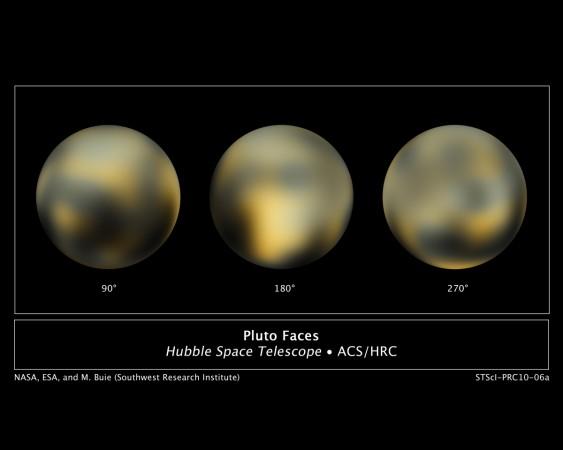
After eight years of exile from the list of planets in our solar system, Pluto might be making a comeback as the ninth planet once again.
Pluto's tumultuous journey of planethood began in 1930, when it was discovered by the astronomer Clyde Tombaugh at Lowell Observatory in Arizona. Just when we were all content with the nine planets of the Solar System, along came the International Astronomical Union, the group that gets to name planetary bodies, in 2006, setting up certain rules for an astronomical body to be considered a planet.
According to Resolution B5, "Definition of a Planet in the Solar System," a planet is a celestial body that: (a) is in orbit around the Sun (b) has sufficient mass for its self-gravity to overcome rigid body forces so that it assumes a hydrostatic equilibrium (nearly round) shape and (c) has cleared the neighbourhood around its orbit.
While a "dwarf planet" is a celestial body that: (a) is in orbit around the Sun, (b) has sufficient mass for its self-gravity to overcome rigid body forces so that it assumes a hydrostatic equilibrium (nearly round) shape2, (c) has not cleared the neighbourhood around its orbit, and
(d) is not a satellite.
Pluto was kicked out of the list of planets, thanks to (c) in criteria to be a planet. According to IAU, Pluto was too small to knock other space rocks out of its path as it orbits the sun. It was demoted to a dwarf planet, leaving our solar system with just eight planets: Mercury, Venus, Earth, Mars, Jupiter, Saturn, Uranus and Neptune.
However, International Astronomical Union's definitions, and the public's attachment to tiny Pluto has sparked many controvertial debates.
On 18 September, the Harvard-Smithsonian Centre for Astrophysics countered IAU's reasoning for calling Pluto the dwarf planet.
"Pluto was booted from the planet club and called a dwarf planet. Is a dwarf planet a small planet? Not according to the IAU. Even though a dwarf fruit tree is still a small fruit tree, and a dwarf hamster is still a small hamster."
After a heated debate on "What a planet is or isn't," hosted by the Harvard-Smithsonian Centre for Astrophysisics, among three leading experts in planetary science - Science historian Dr Owen Gingerich, Minor Planet Centre associate director Dr Gareth Williams and Harvard Origins of Life Initiative director Dr Dimitar Sasselov - the audience concluded that Sasselov's definition won the day, in that Pluto is in fact, a planet.
The vote wasn't official and doesn't really hold any actual weight in the science community but you have got to start somewhere.
Meanwhile, internet has been blowing up with shout-outs for the dwarf planet, which most users think has made an official comeback as a planet.
Someone's back!!! #Pluto #PlutoIsBack pic.twitter.com/hoGgfAgm04
— Gogo San (@Doom7Lord) October 5, 2014
Sakshi Shrivastava posted, "That made me realize, #Pluto has the best underdog story! #PlutoIsAPlanet #plutoisback", while Julia Tesmond tweeted, "pluto is like that kid that got bullied in high school and came back to the reunion better than everyone".
Gareth Knife Party, who never stopped rooting for the dwarf planet, wrote, "Violently ill for a few days only to come back and find Pluto is a planet again. I like a many others never stopped believing in u plubro," while Aria Clemente posted, "On a lighter note, Pluto is a planet again. Welcome back, friedn u r butiful dont let anyon tel u oterwise".
The video of the debate and audience vote has been ulpoaded to CFA Observatory Nights' YouTube Channel:









